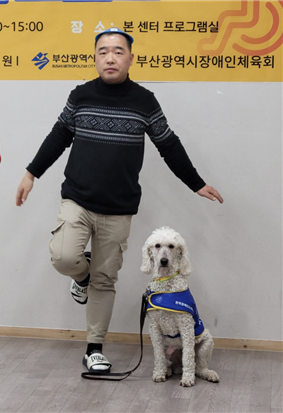The National Epilepsy Care Center rehomed Lily, Korea's first epilepsy helper dog, to an epilepsy patient.

According to the center, while there were helper dogs for visual, hearing, and physical disabilities in Korea, the National Epilepsy Care Center was able to successfully train and rehome an epilepsy helper dog for the first time through the Korea Assistance Dog Association with the support of the Korean Epilepsy Society.
An epileptic helper dog always stays next to a patient, barks loudly when a convulsive seizure occurs, informs the surroundings, goes under the patient's body to prevent damage to the body if they fall, and sometimes warns the patient before a seizure occurs.
Lilly was rehomed to Kim Jeong-cheol, a 47 years old male living in Busan with epilepsy.
The National Epilepsy Care Center stressed that Kim is currently the director of the Jipyong Independent Rehabilitation Center for the Disabled and is taking the lead in improving awareness of the disabled.
"Epileptic patients live in the dark to avoid community prejudice and uncomfortable gazes," Kim said. "I hope that through this project, awareness of epilepsy patients will be improved so that epilepsy patients are not discriminated against and become a caring society."
Kim has received training for five days from the Korea Assistance Dog Association and has been living with Lily for about two weeks.
He expects to receive help during a seizure and feel emotional stability through Lily, and he hopes that many epilepsy patients in Korea will receive help from epilepsy helper dogs.

